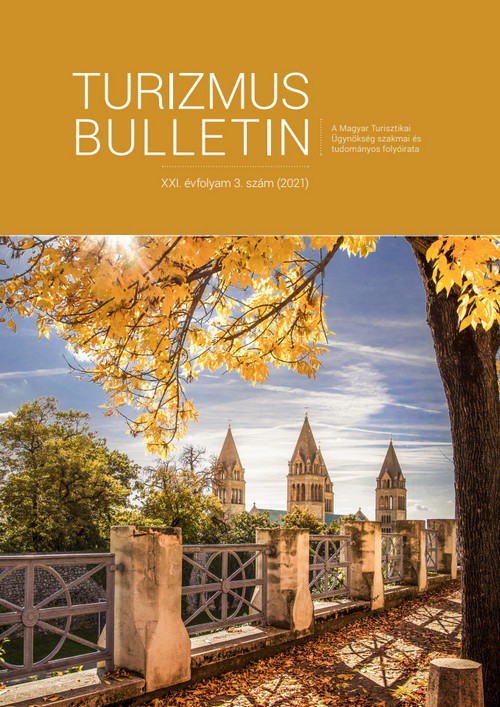Changing mobility behaviour during the Covid19 pandemic
DOI:
https://doi.org/10.14267/TURBULL.2021v21n3.3Keywords:
tourism, Covid19 pandemic, mobility habits, focus group interviews, questionnaireAbstract
The Covid19 outbreak has led to a significant recession in the tourism sector. The recovery from the crisis, in addition to the restrictive measures, is also heavily influenced by the attitudes of society. Based on this, our research team aimed to explore changes in social attitudes towards different modes of transport and tourism-related consumption. To achieve this, data collection in two phases: qualitative (6 focus group interviews) and quantitative representative (n=3025) surveys were conducted. Focus group interviews indicated that domestic tourism will be stronger until the Covid19 pandemic is over, but a quick recovery of international tourism is expected afterwards. The survey revealed cautious, risk-averse attitude among the respondents. A significant proportion of subjects reported that they would be more careful about hygiene during travel, even when the pandemic is over. With this mind, transport and tourism services may need to rethink (e.g., empty middle seats on flights, health checks, epidemic prevention by different tourism service providers) to ensure the recovery of the sector.
References
BABBIE, E. R. (2015): The Practice of Social Research. Nelson Education: Toronto, ON, Canada.
BAKAR, N. A. – ROSBI, S. (2020): Effect of Coronavirus disease (COVID-19) to tourism industry. International Journal of Advanced Engineering Research and Science (IJAERS). 7(4). pp. 189–193. https://dx.doi.org/10.22161/ijaers.74.23
BAUM, T. – HAI, N. T. T. (2020): Hospitality, tourism, human rights and the impact of COVID-19. International Journal of Contemporary Hospitality Management. 32(7). pp. 2397–2407. https://doi.org/10.1108/IJCHM-03-2020-0242
FELKAI P. (2021): Hogyan utazzunk a COVID járvány után? Turizmus Bulletin. 21(1). pp. 44–48. DOI: 10.14267/TURBULL.2021v21n1.5
HIGGINS-DESBIOLLES, F. (2020): The “war over tourism”: challenges to sustainable tourism in the tourism academy after COVID-19. Journal of Sustainable Tourism. 29(4). pp. 551–569. https://doi.org/10.1080/09669582.2020.1803334
JÁSZBERÉNYI M. – PÁLFALVI J. (szerk.) (2009): Nemzetközi közlekedés és turizmus. Aula Kiadó, Budapest.
JOO, H. – MASKERY, B. A. – BERRO, A. D. – ROTZ, L. D. – LEE, Y. K. – BROWN, C. M. (2019): Economic impact of the 2015 MERS outbreak on the Republic of Korea’s tourism-related industries. Health security. 17(2). pp. 100–108. https://doi.org/10.1089/hs.2018.0115
MALHOTRA, N. K. – DASH, S. (2016): Marketing research: An applied orientation. Pearson.
MICHALKÓ G. – ILYÉS N. (2020): A nemkonvencionális turisztikai mobilitás magyarországi sajátosságai, különös tekintettel a turizmusból származó bevételek növelésének lehetőségére. Turizmus Bulletin. 20(5). pp. 6–18. DOI: 10.14267/TURBULL.2020v20n4.1
MISKOLCZI, M. – JÁSZBERÉNYI, M. – TÓTH, D. (2021): Technology-Enhanced Airport Services – Attractiveness from the Travelers’ Perspective. Sustainability. 13(2). pp. 1–18. https://doi.org/10.3390/su13020705
MUNKÁCSY A. (2018): A közlekedés alapfogalmai, a közlekedés szerepe a turizmusban. In: Jászberényi M. – Munkácsy A. (szerk.): Közlekedés, mobilitás, turizmus. Akadémiai Kiadó, Budapest.
QIU, R. T. – PARK, J. – LI, S. – SONG, H. (2020): Social costs of tourism during the COVID-19 pandemic. Annals of Tourism Research. 84. https://doi.org/10.1016/j.annals.2020.102994
ŠKARE, M. – SORIANO, D. R. – PORADA-ROCHO , M. (2021): Impact of COVID-19 on the travel and tourism industry. Technological Forecasting and Social Change. 163. https://doi.org/10.1016/j.techfore.2020.120469
UNTWO (2020): UNWTO World Tourism Barometer, December 2020. 18(7). pp. 1–36.
Internetes források
EC (European Commission) (2021): Travel during the coronavirus pandemic. https://ec.europa.eu/info/live-work-travel-eu/coronavirus-response/travel-during-coronavirus-pandemic_en, Letöltve: 2021. május 10.
ETC (European Travel Commission) (2021): Europeans Increasingly Eager to Travel during Spring 2021 as COVID-19 Vaccine Rollout Begins. , https://etc-corporate.org/news/europeans-increasingly-eager-to-travel-during-spring-2021-as-covid-19-vaccine-rollout-begins/Letöltve: 2021. május 10.
GLOBALDATA (2021): Direct booking providers will have ‘window of opportunity’ in post-pandemic travel. https://www.globaldata.com/direct-booking-providers-will-window-opportunity-post-pandemic-travel/, Letöltve: 2021. május 10.
IFC (International Finance Corporation) (2020): The Impact of COVID-19 on Airports: An Analysis. , https://www.ifc.org/wps/wcm/connect/26d83b55-4f7d-47b1-bcf3-01eb996df35a/IFC-Covid19-AirportFINAL_ web3.pdf?MOD=AJPERES&CVID=n8lgpkGLetöltés: 2021. május 10.
KSH (2021a): Távmunkát végzők a munkaerőpiacon. https://www.ksh.hu/docs/hun/modsz/modsz917.html, Letöltve: 2021. május 10.
KSH (2021b): A bruttó hazai termék (GDP) értéke, volumenindexe és explicit árindexe. , Letöltve: 2021. május https://www.ksh.hu/stadat_eves_3_110.
KSH (2021c): Budapest Liszt Ferenc Repülőtér forgalma országonként. https://www.ksh.hu/docs/hun/xstadat/xstadat_evkozi/e_odmj001. html, Letöltve: 2021. május 10.
UNWTO (2021): International Tourism and COVID-19. https://www.unwto.org/international-tourism-and-covid-19, Letöltve: 2021. augusztus 2.
WHO (2021): COVID-19 reports. https://www.who.int/emergencies/diseases/novel-coronavirus-2019/interactive-timeline?gclid=Cj0KCQjws-OEBhCkARIsAPhOkIZDBnLVYO-ziq2zg10saz4OoJ8j7AXIbrUjadEe8fWY7wd0CvIbCI2YaAtZvEALw_wcB#event-115, Letöltve: 2021. május 10.
WORLD BANK (2007): China Severe Acute Respiratory Syndrome (SARS) and Infectious Diseases Response Program. , https://documents.worldbank.org/en/publication/documents-reports/documentdetail/627391468214499938/china-severe-acute-respiratory-syndrome-sars-and-infectious-diseases-response-programLetöltve: 2021. május 10.

